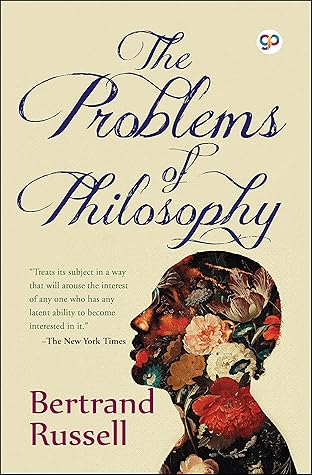More on this book
Community
Kindle Notes & Highlights
Is there any knowledge in the world which is so certain that no reasonable man could doubt it?
the distinction between ‘appearance’ and ‘reality,’ between what things seem to be and what they are.
many philosophers, perhaps a majority, have held that there is nothing real except minds and their ideas. Such philosophers are called ‘idealists.’ When they come to explaining matter, they either say, like Berkeley, that matter is really nothing but a collection of ideas, or they say, like Leibniz (1646-1716), that what appears as matter is really a collection of more or less rudimentary minds.
Thus what we directly see and feel is merely ‘appearance,’ which we believe to be a sign of some ‘reality’ behind. But if the reality is not what appears, have we any means of knowing whether there is any reality at all? And if so, have we any means of finding out what it is like?
This immediate knowledge by memory is the source of all our knowledge concerning the past: without it, there could be no knowledge of the past by inference, since we should never know that there was anything past to be inferred.
The chief importance of knowledge by description is that it enables us to pass beyond the limits of our private experience.
It is neither in space nor in time, neither material nor mental; yet it is something.
Thus universals are not thoughts, though when known they are the objects of thoughts.
The world of universals, therefore, may also be described as the world of being. The world of being is unchangeable, rigid, exact, delightful to the mathematician, the logician, the builder of metaphysical systems, and all who love perfection more than life. The world of existence is fleeting, vague, without sharp boundaries, without any clear plan or arrangement, but it contains all thoughts and feelings, all the data of sense, and all physical objects, everything that can do either good or harm, everything that makes any difference to the value of life and the world. According to our
...more
The ‘practical’ man, as this word is often used, is one who recognizes only material needs, who realizes that men must have food for the body, but is oblivious of the necessity of providing food for the mind.
The man who has no tincture of philosophy goes through life imprisoned in the prejudices derived from common sense, from the habitual beliefs of his age or his nation, and from convictions which have grown up in his mind without the co-operation or consent of his deliberate reason.
Thus, to sum up our discussion of the value of philosophy; Philosophy is to be studied, not for the sake of any definite answers to its questions, since no definite answers can, as a rule, be known to be true, but rather for the sake of the questions themselves; because these questions enlarge our conception of what is possible, enrich our intellectual imagination and diminish the dogmatic assurance which closes the mind against speculation; but above all because, through the greatness of the universe which philosophy contemplates, the mind also is rendered great, and becomes capable of that
...more


